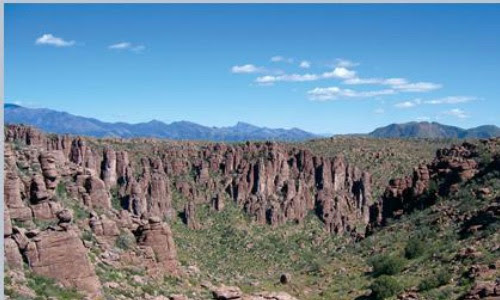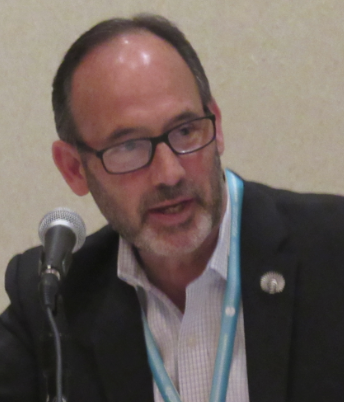
- Details
- By Kevin J. Allis
Opinion. As the end of Trump administration approaches, a few large-scale mining and energy projects on federal lands appear to hastily be moving towards final approval in an effort to ensure that these projects move ahead even after President-elect Joseph R. Biden Jr. takes office.
In Arizona, the Forest Service is putting the final touches on the transfer of federal forest land that would pave the way for the construction of one of the nation’s largest copper mines. In Utah, the Interior Department will likely grant approval as soon as next week, thus allowing a band of energy investors who have an eye on a remote spot inside an iconic national wilderness area where new energy leasing is currently banned, to begin drilling into what is believed to be an extensive underground supply of helium. In northern Nevada, the Department is close to granting final approval to construct a sprawling open-pit lithium mine on federal land that sits above a prehistoric volcano site.
When President-elect Biden takes office on Jan. 20, he may still have the ability to reshape, slow or even block certain projects, but for some it won’t be easy and for others nearly impossible to do anything. Certainly, with his selection of Representative Deb Haaland as his Interior Secretary, a Democrat from New Mexico and a citizen of the Pueblo of Laguna, these projects will be a priority during the initial days of her tenure as Secretary. But her hands may be tied, as some of these projects will have already received the final approval needed to move forward. However, some, like a planned uranium mine in South Dakota and the helium drilling project in Utah, will require further approvals, or already face lawsuits seeking to stop them. But others, like the lithium mine in Nevada and the copper mines in Arizona could possibly already have the needed approvals, and will be hard for the next administration to stop.
Last month, the Environmental Protection Agency cleared the way for the construction of a new uranium mine called the Dewey-Burdock project, spread over 12,613 acres near the Black Hills region of South Dakota. The Oglala Lakota Nation, whose 2.8 million-acre reservation is adjacent to the proposed uranium mine, has sued to block the project. The site of the project sits on land the Sioux tribe has long claimed was illegally taken by the United States. Given that this lawsuit is in motion, and that a small portion is on “Interior” land, any final approval would not happen until after Trump leaves office, paving the way for the Biden Administration to slow or even block the project.

For the proposed copper mine in Arizona’s Tonto National Forest, adjacent to Apache tribal land, the Forest Service is expected to issue its long-awaited final environmental assessment by mid-January. This means that a 2,422-acre chunk of the Tonto forest, an area called Oak Flat, will automatically be transferred to Resolution Copper, a subsidiary of the international mining company Rio Tinto. This transfer, in exchange for land nearby, is a deal Congress approved in a “midnight” rider of the 2014 National Defense Authorization Act. The land is sacred to the San Carlos Apache and other tribes in the region, and its destruction would be devastating. The Interior Department’s own National Register of Historic Places lists the Oak Flat area as “a holy place and ancestral homeland to the Western Apache Indians” that is also “a venue for ongoing Apache participation in traditional social activities, and is associated with traditions rooted in the history” of the tribe. Under the current Forest Service plan, much of Oak Flat would eventually be forever destroyed. The Forest Service itself recently acknowledged to community leaders that pressure to get the evaluation of the project done quickly was coming from the highest level of the Administration, even mentioning the Agriculture Department, which oversees the service. Federal records show that the environmental study until recently was expected to continue until the middle of 2021. It is now slated to be finished in the next 10-15 days.
As the 116th Congress concludes in the next couple days, and the 117th Congress convenes, tribal leaders across the nation need to consider voicing strong concerns regarding the damage such projects will inflict upon Indian Country… damage that can never be remedied.
Moving forward on each is counter to the treaty and trust obligations the United States has to Indian Country, and the incoming Biden Administration needs to be educated on the harm these projects pose, and how they violate the government’s trust obligations.
The time is now… there is no time to waste, and all tribal nations must come together to ensure, solidify and further strengthen their rightful place as sovereigns.
Thunderbird Strategic is eager to assist in Washington D.C. on efforts to shut these projects down… not just for now, but forever.
Kevin Allis (Forest County Potawatomi Community) is president of Thunderbird Strategies, LLC, based in Washington, D.C. He is the former CEO of the National Congress of American Indians. He may be reached at [email protected]
More Stories Like This
The SAVE America Act Threatens Native Voting Rights — We Must Fight BackThe Presidential Election of 1789
Cherokee Nation: Telling the Full Story During Black History Month
Jesse Jackson Changed Politics for the Better
Native News Online at 15: Humble Beginnings, Unwavering Mission
Help us defend tribal sovereignty.
At Native News Online, our mission is rooted in telling the stories that strengthen sovereignty and uplift Indigenous voices — not just at year’s end, but every single day.
Because of your generosity last year, we were able to keep our reporters on the ground in tribal communities, at national gatherings and in the halls of Congress — covering the issues that matter most to Indian Country: sovereignty, culture, education, health and economic opportunity.
That support sustained us through a tough year in 2025. Now, as we look to the year ahead, we need your help right now to ensure warrior journalism remains strong — reporting that defends tribal sovereignty, amplifies Native truth, and holds power accountable.
 The stakes couldn't be higher. Your support keeps Native voices heard, Native stories told and Native sovereignty defended.
The stakes couldn't be higher. Your support keeps Native voices heard, Native stories told and Native sovereignty defended.
Stand with Warrior Journalism today.
Levi Rickert (Potawatomi), Editor & Publisher
